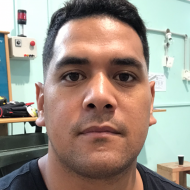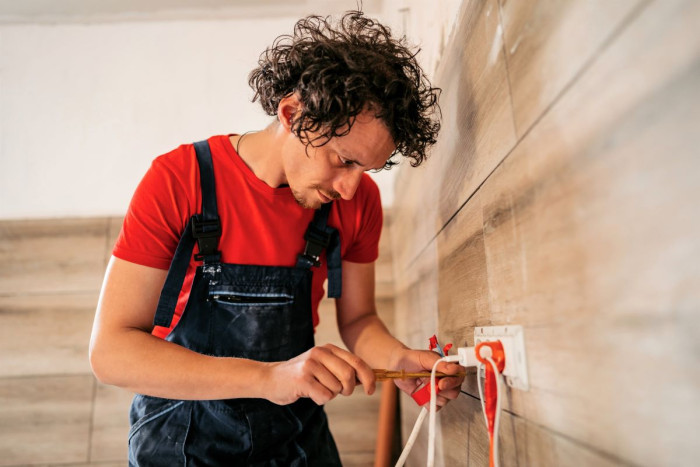Electrician
Kaimahi Hiko
Alternative titles for this job
Electricians test, install, maintain and repair electrical systems and equipment.
Pay
Electricians usually earn
$31-$51 per hour
Electricians can earn
$24-$63 per hour
Source: TEC research.
Job opportunities
Pay
Pay for electricians varies depending on skills, experience and the type of work they do.
- Electricians usually earn $31 to $51 per hour.
- Electricians can earn $24 to $63 an hour.
Source: TEC research.
- PAYE.net.nz website - use this calculator to convert pay and salary information
- Employment New Zealand website - information about minimum wage rates
(This information is a guide only. Find out more about the sources of our pay information)
What you will do
Electricians may do some or all of the following:
- interpret electrical information on diagrams and plans
- check for errors in diagrams and plans
- install electrical wiring and equipment
- repair and replace electrical wiring, parts and equipment
- safety-test work
- keep records of problems they find, and the work they do
- prepare job and other quotes, or provide information for quotes.
Skills and knowledge
Electricians need to have knowledge of:
- electrical theory, laws, codes, and standards of practice
- how to install electrical wiring and fixtures
- how to draw wiring diagrams and floor plans
- basic maths and physics
- safety procedures and first aid.
Self-employed electricians must also have business skills.
Working conditions
Electricians:
- usually work regular business hours, but may work weekends, public holidays, or be on call
- may work at construction sites or in buildings, power generation stations or substations
- may work at heights and in enclosed, noisy, dirty, dusty, or hazardous conditions
- travel to local worksites.
What's the job really like?

Sainila Tagi
Apprentice Electrician
From stonemasonry to electricity
Sainila Tagi knew it was time for a career change when his body started hurting.
"I was working with dad in his stonemasonry business, but my body got sore and it wasn’t for me," says Sainila.
So he did two pre-trade certificates, found he liked electrical work, and now has 18 months to go on an electrician’s apprenticeship.
"Just learning about these formulae and how electricity functions – I find it very interesting.
"I locked my mind on the electrical field and knew that was what I wanted to do."
Get stuck in if you want to be an electrician
"If somebody was thinking about a career in electrical, I would tell them to do it," says Sainila.
"It's fun and interesting and you learn heaps. Get stuck in and work hard and you will enjoy it as much as I do, if not more."
Electrician video
Opal Styrdom talks about being an electrician – 2.18 mins.
I built all of this. We reused some timber, but built all the drawers myself,
took inspiration from some of the other guys' vans.
One of the things that I really love that was all me,
is I've got a little flap here,
which allows me to access all my tools and stuff. The great thing about being an
electrician is that there is always work.
There's always someone who needs power,
always someone who needs something fixed. So you're never short on work.
To be honest once you get qualified,
you can go anywhere in the world with your qualification. One of my favourite
things about working in residential is I get to meet people.
I get to go to their houses, I get to see them, get to see their lives,
and at the end of the day, I've helped make their lives better.
Okay. Right now we are in our training room in our office. This is to show you what
it looks like behind your walls. Do you want a light switch?
You need some cabling and that'll run back to your switchboard.
What I have here is a little non-contact voltage tester.
So if we go to a light switch and I wanna make sure that this is, this is dead,
it's not live, it's not gonna shock me, so I can work on it.
We now need to go to a live source to check that my actual tester is working.
So we can see if we go here, it's flashing red. And if we go back,
we can check. Yeah, still dead. Everything's still working.
I'm safe to be working on this. The great thing about if you wanna be an
electrician is that you don't need a lot of pre-knowledge because we teach you all
of that on the job. However,
it's good to have an understanding around physics and maths because you wanna
understand the principles of electricity and how electricity flows from one
thing to another and how a circuit works. So if you've got those foundations,
it becomes really easy to understand and learn and figure out how things going.
But at the end of the day,
if you've just got a passion and a drive to wanna be an electrician,
we'll sort you out. I knew nothing when I started . I knew nothing.
I really didn't know what I was getting myself into.
And the fact that I've gotten where I am is, is so awesome.
Do my thing. Get out. Oh, it's raining.
I am off to go fix a towel rail, we've got one that's broken,
client's got a new one, so we're gonna go replace that,
get that all working for her.
Entry requirements
You need to do an apprenticeship and get a qualification to become an electrician.
You need:
- to do an apprenticeship and get a New Zealand Certificate in Electrical Engineering Theory and Practice (Trade) (Level 4) OR Electrical Trade (Electricity Supply and General Electrical) (Level 4) or similar
- a Trainee Limited Certificate from the Electrical Workers Registration Board.
You also need to be registered with the Electrical Workers Registration Board.
You may need to:
- have a driver's licence
- have access to a car to get to worksites
- pass a drug test.
High-voltage power training
Grid Skills (part of Transpower) trains people to work with high-voltage power, for example, in substations.
This training takes up to two years and can be done by apprentices or qualified electricians.
Secondary education
You need NCEA Level 2 to do the study or training for this job.
For Year 11 to 13 learners, trades academies and the STAR and Gateway programmes are good ways to gain relevant experience and skills.
These programmes may help you gain an apprenticeship, but do not reduce the amount of time it takes to complete it.
Personal requirements
Electricians need to be:
- accurate and methodical
- practical and logical
- good communicators
- able to work well alone or in a team
- safety-conscious
- good at problem solving.
Useful experience
Useful experience for electricians includes construction or engineering work.
Physical requirements
Electricians need to:
- have normal colour vision, to identify different-coloured cables
- be reasonably fit, healthy and strong, as the work involves climbing and lifting
- be comfortable working in confined spaces and at heights, as they may need to crawl through tight spaces under buildings and above ceilings.
Registration
Electricians need to be registered with the Electrical Workers Registration Board, unless they:
- are going to work under the supervision of somebody else who is registered
- need extra work experience while they are training, in which case they need a Limited Certificate.
Electricians need to complete a competency programme every two years to refresh their knowledge and renew their licence.
Find out more about training
- ATT
- 0800 187 878 - info@att.org.nz - www.att.org.nz
- The Electrical Training Company (ETCO)
- 0800 275 3826 -info@etco.co.nz - www.etco.co.nz
- Te Pūkenga
- 0800 327 648 (0800 EARN IT) - https://earnlearn-tepukenga.ac.nz
What are the chances of getting a job?
Construction boom and worker shortages drive demand for electricians
High demand for qualified electricians is expected to continue due to:
- increased residential and commercial construction, especially in wealthy areas with high population growth
- an ageing workforce
- low numbers of school leavers entering electrical apprenticeships
- the need for electricians who know how to work with new technologies.
According to the Census, 30,000 electrical workers were employed in New Zealand in 2018.
Electrician on skill shortage list
Electrician appears on Immigration New Zealand's long-term skill shortage list. This means the Government is actively encouraging skilled electricians from overseas to work in New Zealand.
Types of employers varied
Electricians may work for:
- power-generation companies
- Transpower on the high-voltage national grid.
They may be self-employed and work for contracting businesses or run their own business.
Sources
- Ainsworth, A, technical specialist, Grid Skills (Transpower), careers.govt.nz interview, September 2019.
- Electrical Workers Registration Board website, accessed August 2019, (www.ewrb.govt.nz).
- Flatman, M, candidate consultant, Allied Work Force, careers.govt.nz interview, August 2019.
- Immigration New Zealand, 'Long Term Skill Shortage List', 27 May 2019, (www.immigration.govt.nz).
- Miller, J, project business analyst, Skills, careers.govt.nz interview, August 2019.
- Ministry of Business, Innovation and Employment, 'Future Demand for Construction Workers', July 2017, (www.mbie.govt.nz).
- Ministry of Business, Innovation and Employment, 'National Construction Pipeline Report', July 2018, (www.mbie.govt.nz).
- Skills website, accessed August 2019, (www.skills.org.nz).
- Sole, J, chief executive offer, The Electrical Training Company, careers.govt.nz interview, August 2019.
- Stats NZ, '2018 Census Data', 2019.
(This information is a guide only. Find out more about the sources of our job opportunities information)
Progression and specialisations
Electricians may progress to:
- project managers
- consultants at building construction companies or engineering firms
- site supervisors.
With further training they may progress to:
- electrical inspectors
- electrical engineering technicians
- electrical engineers.
Electricians may specialise in:
- low-voltage electrical work on houses, and commercial or industrial buildings
- high-voltage electrical work (over 1000 volts) on power stations, substations and other sites.
Last updated 28 March 2025


